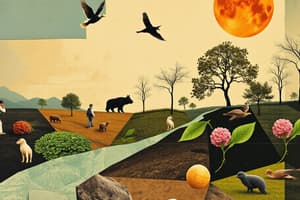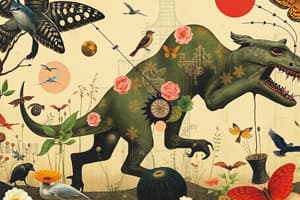Podcast
Questions and Answers
What term describes the relationship between the Plover Bird and the Nile Crocodile?
What term describes the relationship between the Plover Bird and the Nile Crocodile?
- Predator-Prey
- Mutualism (correct)
- Commensalism
- Parasitism
Which term describes organisms that cannot produce their own food?
Which term describes organisms that cannot produce their own food?
- Autotrophs
- Heterotrophs (correct)
- Decomposers
- Scavengers
Which term refers to the portion of the Earth that sustains life?
Which term refers to the portion of the Earth that sustains life?
- Habitat
- Biomes
- Ecosystem
- Biosphere (correct)
What term best describes the feeding steps in a food chain?
What term best describes the feeding steps in a food chain?
What type of relationship is shown when one organism benefits while the other is unaffected?
What type of relationship is shown when one organism benefits while the other is unaffected?
In the ecosystem, what is the role of a decomposer?
In the ecosystem, what is the role of a decomposer?
Which of the following is an example of parasitism?
Which of the following is an example of parasitism?
What term best describes a series of feeding relationships in an ecosystem?
What term best describes a series of feeding relationships in an ecosystem?
Flashcards are hidden until you start studying
Study Notes
Ecology
- Ecology - the study of interactions among organisms and their environment
- Biosphere - the portion of the Earth that supports life
- Abiotic Factors - non-living components of an environment (sunlight, water, soil, air, temperature)
- Biotic Factors - all the living things that inhabit an environment (animals, plants, monerans, fungi, protists)
- Ecosystem - a community and its abiotic environment, interactions among populations in a community with each other and the abiotic factors
- Community - a group of interacting populations
- Population - a group of organisms all the same species in an area
- Niche - the role or job an organism has in its environment
- Habitat - the place an organism lives out its life
Food Chains and Food Webs
- Food chain - a simple model to show energy flow in an ecosystem (very linear)
- Trophic Level - the feeding steps that are found in food chains and food webs
- Autotroph - an organism that can make its own food
- Heterotroph - an organism that cannot make its own food and must feed on others for energy
- Scavenger - animals that feed on organisms that have already died
- Decomposer - organisms that break down and absorb nutrients from dead organisms
- Food Web - shows all the feeding relationships in the environment
Symbiosis
- Symbiosis - any close permanent relationship among organisms of different species
- Mutualism - a relationship in which both organisms benefit
- Commensalism - a relationship in which one organism benefits and the other is unaffected
- Parasitism - a relationship in which one organism benefits at the expense of another
Studying That Suits You
Use AI to generate personalized quizzes and flashcards to suit your learning preferences.




